朱明zhubob-新思维综合英语2Unit8 语法知识点
全新版大学英语2(第二版) UNIT8 语言点上课讲义

全新版大学英语2(第二版)U N I T8语言点Unit 8 Protecting Our EnvironmentWhen man is happy, he is in harmony with himself and his environment. —OscarWilde 人类幸福之时,亦即人类自身和谐生活且与环境和谐共处之时。
——奥斯卡·王尔德Detailed ReadingⅠ. Difficult Sentences1.(Para.1) In autumn, oak and maple and birch set up a blaze of colourthat flamed and flickered across a backdrop of pines.1. Paraphrase the sentence.(=In autumn, the leaves of oaks, maples and birches turned bright red against a background of green pines.)2. Translate this sentence into Chinese.(=秋季到来时,橡树、枫树和白桦树五彩缤纷,在大片松林的衬托下如同一片火海,熠熠生辉。
)2.(Para.2) The countryside was, in fact, famous for the abundance andvariety of its bird life, and when the flood of migrants was pouringthrough in spring and autumn people travelled from great distancesto observe them.1. Understand the long sentence.(=This is a compound sentence connected with the transitional word “and”. Inthe second main clause, a sub-clause of time “when the flood of…”is used.)2. Translate this sentence into Chinese.(=事实上,这里的乡村鸟类品种丰富,数量可观,因此远近闻名。
朱明zhubob-新思维综合英语2unit 1语法知识点
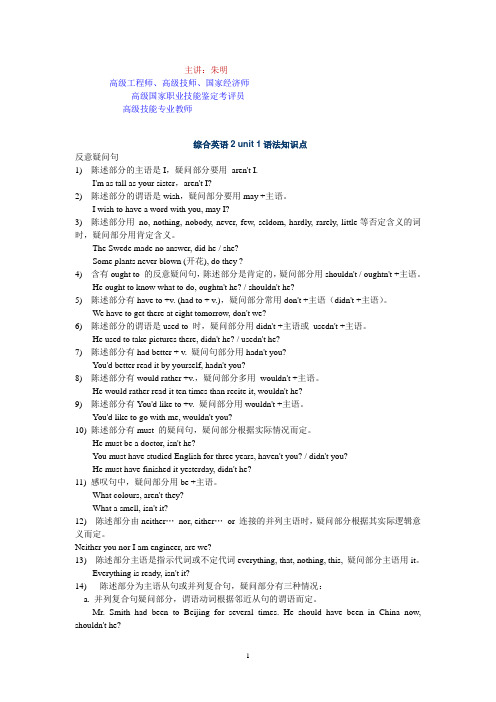
主讲:朱明高级工程师、高级技师、国家经济师高级国家职业技能鉴定考评员高级技能专业教师综合英语2 unit 1语法知识点反意疑问句1)陈述部分的主语是I,疑问部分要用aren't I.I'm as tall as your sister,aren't I?2)陈述部分的谓语是wish,疑问部分要用may +主语。
I wish to have a word with you, may I?3)陈述部分用no, nothing, nobody, never, few, seldom, hardly, rarely, little等否定含义的词时,疑问部分用肯定含义。
The Swede made no answer, did he / she?Some plants never blown (开花), do they ?4)含有ought to 的反意疑问句,陈述部分是肯定的,疑问部分用shouldn't / oughtn't +主语。
He ought to know what to do, oughtn't he? / shouldn't he?5)陈述部分有have to +v. (had to + v.),疑问部分常用don't +主语(didn't +主语)。
We have to get there at eight tomorrow, don't we?6)陈述部分的谓语是used to 时,疑问部分用didn't +主语或usedn't +主语。
He used to take pictures there, didn't he? / usedn't he?7)陈述部分有had better + v. 疑问句部分用hadn't you?You'd better read it by yourself, hadn't you?8)陈述部分有would rather +v.,疑问部分多用wouldn't +主语。
大学英语综合教程2UNIT8
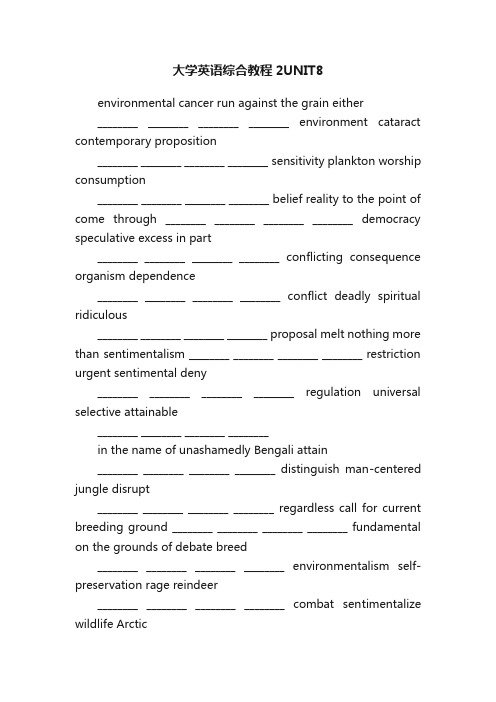
大学英语综合教程2UNIT8environmental cancer run against the grain either________ ________ ________ ________ environment cataract contemporary proposition________ ________ ________ ________ sensitivity plankton worship consumption________ ________ ________ ________ belief reality to the point of come through ________ ________ ________ ________ democracy speculative excess in part________ ________ ________ ________ conflicting consequence organism dependence________ ________ ________ ________ conflict deadly spiritual ridiculous________ ________ ________ ________ proposal melt nothing more than sentimentalism ________ ________ ________ ________ restriction urgent sentimental deny________ ________ ________ ________ regulation universal selective attainable________ ________ ________ ________in the name of unashamedly Bengali attain________ ________ ________ ________ distinguish man-centered jungle disrupt________ ________ ________ ________ regardless call for current breeding ground ________ ________ ________ ________ fundamental on the grounds of debate breed________ ________ ________ ________ environmentalism self-preservation rage reindeer________ ________ ________ ________ combat sentimentalize wildlife Arctic________ ________ ________ ________ ecological creature refuge mate________ ________ ________ ________ atmosphere resistance work one’s way similarly________ ________ ________ ________ ozone voter congress owl________ ________ ________ ________ layer vote exploration aesthetic________ ________ ________ ________ reduction snail darter conserve livelihood________ ________ ________ ________(自然)环境的癌,恶性肿瘤与…格格不入;违反意愿只能两者选择其一的________ ________ ________ ________环境白内障当代的,现代的提议;命题________ ________ ________ ________敏感(性)浮游生物崇拜,崇敬消费(量)________ ________ ________ ________信念;相信现实;真实达到…的程度经历;从…活下来________ ________ ________ ________民主(制度)猜测性的,推测的过渡,无节制在某种程度上;部分地________ ________ ________ ________不一致的,冲突的后果,结果生物体,有机体依靠,依赖________ ________ ________ ________冲突vi. 致命的,毁灭性的精神的;非物质的可笑的,荒谬的________ ________ ________ ________提议,建议融化,溶化无异于;只不过感情用事;多愁善感________ ________ ________ ________限制;限制性规定紧急的;急迫的感情用事的;多愁善感的不给;不准________ ________ ________ ________规章;规定全世界的;普遍的选择的;有选择性的可达到的;可得到的________ ________ ________ ________以…为由坦然地,满不在乎地孟加拉人;孟加拉语达到;取得________ ________ ________ ________区别,辨别以人为中心的杂乱无章的事物;丛林使陷于混乱;干扰________ ________ ________ ________不顾一切地;无论如何要求当前的,现在的动物繁殖的地方________ ________ ________ ________基本的,根本的因为;以…为理由辩论,争论繁殖;产________ ________ ________ ________环境保护论;环境论自我保护激烈的进行驯鹿________ ________ ________ ________斗争,战斗感情用事地对待野生动植物北极(的),北极圈(的)________ ________ ________ ________生态的;生态学的生物庇护所;避难处(使)交配________ ________ ________ ________大气;气氛反对,反抗设法抵达;努力达到目标同样地,相同地________ ________ ________ ________臭氧投票者,选举人国会;立法机关猫头鹰________ ________ ________ ________层投票选举勘查,探测;探索美学的;美感的;美的________ ________ ________ ________减少蜗牛鱼保护,保存生计________ ________ ________ ________logging accommodate lesser moderate________ ________ ________ ________log fate pollutant concern________ ________ ________ ________ distinction bind generatorframe________ ________ ________ ________ charge e.g. fatal frame of mind ________ ________ ________ ________ well-being atmospheric ecosystem humanistic________ ________ ________ ________ accommodate threat________ ________106 words伐木业适应;容纳n. 较小的,更少的,次要的适中的;适度的________ ________ ________ ________砍伐;伐(木)命运;结局污染物有利害关系的事;担忧________ ________ ________ ________区别,差别捆;将…绑在一起发电机状态;框架________ ________ ________ ________被照顾的人例如致命的;毁灭性的心绪;心境________ ________ ________ ________幸福;福祉大气的生态系统人本主义的________ ________ ________ ________适应新的情况;迁就威胁________ ________106 单词。
综合英语教程2-Unit 8

Sentences I have an arsenal of USB thumb drives. We wonder how the pyramids were built and know that there had to be some incredible engineers during those ancient times. I’ll tell you. The second manager ’s floppy disk looked intact, so I asked him how and where he stored his disk.
Check Your Answers
Book 2-Unit 8
a. Why on earth would I keep such a thing? b. That was until when one day two managers came ... no longer worked. c. The manager replied, “I had it pinned up ... I didn’t misplace the disk.” d. I tried not to laugh ... that punching holes into the disk was a no-no. e. With a smile and look of confidence he replied, “I use ... and I don’t use any push pins!” f. What is worse is that ... my lifetime than I have new pairs of shoes. g. Data carved in stone seems ... survive for thousands of years. h. I should make a necklace out of them ... on the drives anyway. i. At this time, I really don’t need ... It appears that having it stored on a fish is sufficient.
朱明zhubob-新思维综合英语2综合语法练习一
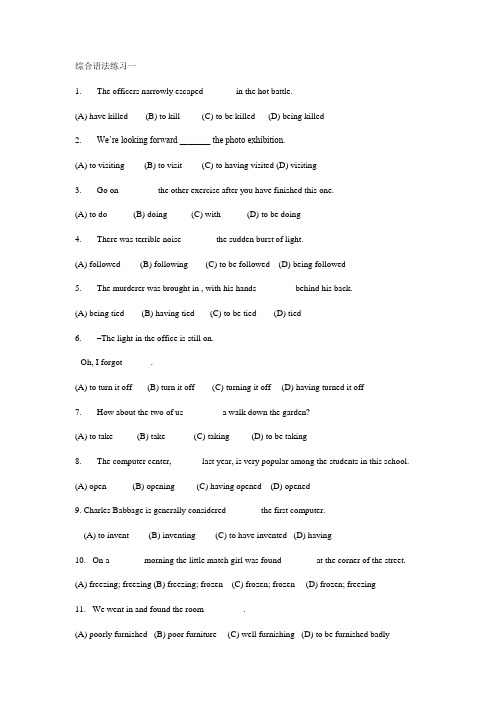
综合语法练习一1. The officers narrowly escaped_______ in the hot battle.(A) have killed (B) to kill (C) to be killed (D) being killed2. We’re looking forward _______ the photo exhibition.(A) to visiting (B) to visit (C) to having visited (D) visiting3. Go on ________ the other exercise after you have finished this one.(A) to do (B) doing (C) with (D) to be doing4. There was terrible noise _______ the sudden burst of light.(A) followed (B) following (C) to be followed (D) being followed5. The murderer was brought in , with his hands ________ behind his back.(A) being tied (B) having tied (C) to be tied (D) tied6. –The light in the office is still on.--Oh, I forgot ______.(A) to turn it off (B) turn it off (C) turning it off (D) having turned it off7. How about the two of us ________ a walk down the garden?(A) to take (B) take (C) taking (D) to be taking8. The computer center, ______ last year, is very popular among the students in this school.(A) open (B) opening (C) having opened (D) opened9. Charles Babbage is generally considered _______ the first computer.(A) to invent (B) inventing (C) to have invented (D) having10. On a _______ morning the little match girl was found _______ at the corner of the street.(A) freezing; freezing (B) freezing; frozen (C) frozen; frozen (D) frozen; freezing11. We went in and found the room_________.(A) poorly furnished (B) poor furniture (C) well furnishing (D) to be furnished badly12. The students expected there ________ more reviewing classes before the final exams.(A) is (B) being (C) have been (D) to be13. In those days my family didn’t have enough room__________.(A) to live (B) living in (C) to live in (D) living14. He likes _________ , but he doesn’t like _______ today because it is too cold.(A) to swim; to swim (B) swimming; swimming(C) to swim; swimming (D) swimming; to swim15. Since he doesn’t want to accept your advice. It is no use ________ to him again.(A) in talking (B) talking (C) to talk (D) of talk16. Have you any objection to __________ to Beijing by air?(A) be going (B) going (C) go (D) went17. We regret ________ that the movie was not worth_________.(A) to say; to see(B) to say; seeing (C) saying; to see (D) saying; to seeing18. ________ the book, the writer tried _______ a publisher.(A) Finishing; finding (B) Having finished; to find(C) To finish; to find (D) Being finished; finding19. He couldn’t open the window, so he tried ________ it.(A) push (B) to push (C) pushed (D) pushing20. If you want a letter ________, you must kept in mind several rules while________.(A) written; written (B) well written; writing(C) well writing; writing (D) well written; written21.________ from the hill, the little village looks more beautiful.(A) To see (B) Being seen (C) Seeing (D) Seen22.The police caught the thief _________ the book.(A) steal (B) to steal (C) stealing (D) stole23.“Why were you late?”“I had a hard time ________ up this morning.”(A) to get (B) get (C) got (D) getting24.I won’t pay 35 dollars for the coat; it’s not worth_________.(A) all that much (B) that much (C) that all much (D) much all that25.The speaker, _______ for her splendid speeches, was warmly received by the audience.(A) having known (B) knowing (C) being known (D) know26.The man was seen _______ down and the driver driving away.(A) knock (B) be knocked (C) knocked (D) having knocked27.Seceral girl s ________ towards the playground at about nine o’clock.(A) were seen run (B) saw running(C) were seen running (D) have been seen running28.She is often heard _______ English aloud in the morning.(A) to read (B) sang (C) to have sung (D) to be reading29.I got a letter from Patricia this morning, ________ that she’s expecting another baby.(A) saying (B) writing (C) telling (D) speaking30.The servant went upstairs. Soon he returned and asked_______.(A) Jone to follow him (B) Jone follow him (C) Jone followed him (D) Jone follows him31.The teacher doesn’t permit _________ in class.(A) smoke (B) to smoke (C) smoking (D) to have a smoke32.________ the meeting himself gave them a great deal of encouragement.(A) The mayor will attend (B) The mayor to attend(C) The mayor attending (D) The mayor’s attending33.You r hair needs________ . You’d better have it ________ tomorrow.(A) to be cut; do (B) cutting; doing (C) to be cut; done (D) cutting; to be done34.The child pretended _________ to what his mother was saying.(A) to be not listening (B) not listening (C) not to be listening (D) listening35.______ in pencil, the letter was difficult________ out.(A) Being written; in making (B) Written; to make(C) Having written; to make (D) Having been written; making36.“Do you all understand what I mean? I try to make me ________ by all of you.”(A) understand (B) understood (C) to understand (D) understanding37.New ways have been found to prevent the river_________.(A) not to be polluted (B) against polluting (C) from polluting (D) from being polluted38.Having been delayed by heavy snow,_________.(A) they arrived late(B) it is impossible for them to arrive on time(C) it led to them being late(D) their friend thought that they would be late39.________ , I couldn’t enter the room.(A) To lose my key (B) My key has lost(C) My key to be lost (D) My key having been lost40.I intended _______ that year, but my mother suddenly fell ill.(A) to go abroad (B) having gone abroad(C) to have gone abroad (D) going abroad41.He has no choice but ________ to see him.(A) to go (B) go (C) going (D) goes42._________ him do this job by himself?(A) Why not let (B) Why don’t let(C) Why not to let (D) Why you not to let43.He moved away from his parents and missed them ______ enjoy the exciting life in New York.(A) too much to (B) very much to (C) much so as to (D) enough to44. ________ the weather was going to take a turn for the worse, we decided to stay at home.(A) But that (B) As for (C) Seeing that (D) As to45.I don’t like _______ with me a bout religion.(A) them joking (B) their joke (C) that they joke (D) them joke46.When the streets are full of melting snow, you can’t help _______ your shoes wet.(A) get (B) to get (C) but get (D) but getting47.“Would you join us in the game this afternoon?”“Oh. I ________ but I but an appointment.”(A) would love to so (B) would love it (C) would love to (D) would love to do48.To succeed in a difficult task, _________.(A) one needs to be persistent (B) persistence is need(C) you need be a persistent person (D) persistence is what one needs49.There was nothing they could do but _______ for a mechanic to arrive.(A) to wait (B) waiting (C) wait (D) waited50.He finds himself _______ by too many phone calls every day.(A) troubling (B) troubled (C) to be troubled (D) that I should say。
朱明zhubob-新思维综合英语2Unit7综合练习打印版
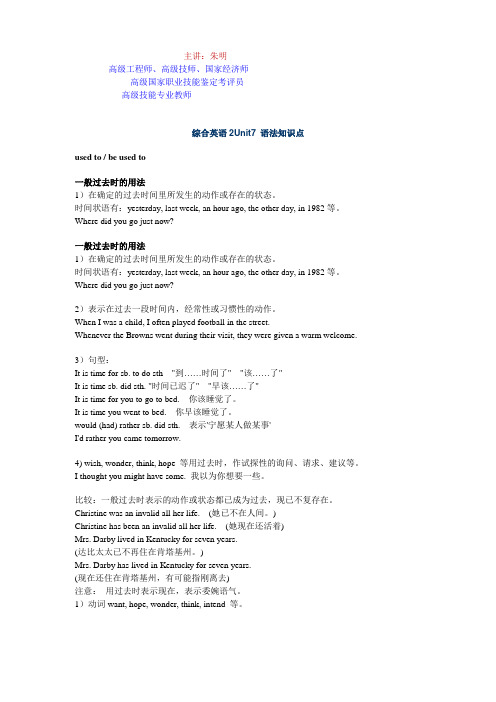
主讲:朱明高级工程师、高级技师、国家经济师高级国家职业技能鉴定考评员高级技能专业教师综合英语2Unit7 语法知识点used to / be used to一般过去时的用法1)在确定的过去时间里所发生的动作或存在的状态。
时间状语有:yesterday, last week, an hour ago, the other day, in 1982等。
Where did you go just now?一般过去时的用法1)在确定的过去时间里所发生的动作或存在的状态。
时间状语有:yesterday, last week, an hour ago, the other day, in 1982等。
Where did you go just now?2)表示在过去一段时间内,经常性或习惯性的动作。
When I was a child, I often played football in the street.Whenever the Browns went during their visit, they were given a warm welcome.3)句型:It is time for sb. to do sth"到……时间了""该……了"It is time sb. did sth. "时间已迟了""早该……了"It is time for you to go to bed.你该睡觉了。
It is time you went to bed.你早该睡觉了。
would (had) rather sb. did sth.表示'宁愿某人做某事'I'd rather you came tomorrow.4) wish, wonder, think, hope 等用过去时,作试探性的询问、请求、建议等。
朱明zhubob-新思维综合英语2Unit8语法知识点和综合练习打印版
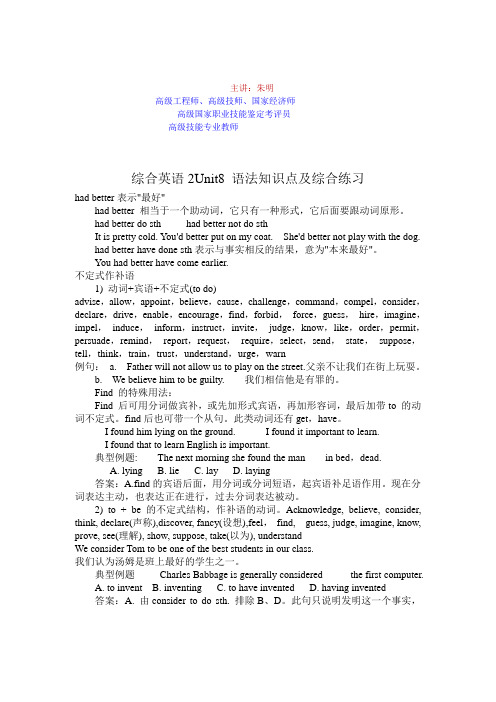
主讲:朱明高级工程师、高级技师、国家经济师高级国家职业技能鉴定考评员高级技能专业教师综合英语2Unit8 语法知识点及综合练习had better表示"最好"had better 相当于一个助动词,它只有一种形式,它后面要跟动词原形。
had better do sth had better not do sthIt is pretty cold. You'd better put on my coat.She'd better not play with the dog.had better have done sth表示与事实相反的结果,意为"本来最好"。
You had better have come earlier.不定式作补语1) 动词+宾语+不定式(to do)advise,allow,appoint,believe,cause,challenge,command,compel,consider,declare,drive,enable,encourage,find,forbid,force,guess,hire,imagine,impel,induce,inform,instruct,invite,judge,know,like,order,permit,persuade,remind,report,request,require,select,send,state,suppose,tell,think,train,trust,understand,urge,warn例句:a.Father will not allow us to play on the street.父亲不让我们在街上玩耍。
b.We believe him to be guilty.我们相信他是有罪的。
Find 的特殊用法:Find 后可用分词做宾补,或先加形式宾语,再加形容词,最后加带to 的动词不定式。
综英2-Unit 8

Cancel plans. Give an execuse.
A: I’m sorry to let you down, but I can’t go to the concert tonight.
I have too much work to do.
B: That’s OK. I understand.
Maybe we’re both a little edgy. edgy adj. = nervous and angry 刀口锐利的,引申“急躁的,神经质的或者易发怒的”
C
T:Would you mind if I opened this window? 平时我们说 Would you mind if I open this window? 在if从句里用虚拟语气,语气更为委婉。
R: Maybe that’s Steve. I might be able to go to the concert after all. after all = in spite of all the work that I must do 终归 after all 还可以表示“毕竟” --Don’t blame him. He is a child after all.
The movie starts at 8:00. Do you want to get a bite to eat first?
Preview
Look, I’m really sorry to let you down, but…
A
R:Oh, am I supposed to call him back? be supposed to do = should do 应该,应当 --When is the ship supposed to leave? --We’re supposed to check out of the hotel at 12. --What time are we supposed to be there? 否定式 be not supposed to = be not allowed to --You’re not supposed to be working. You haven’t quite recovered yet. call sb back 回电话 --I called him up at 3:00, but he hadn’t called (me) back by 6:00.
- 1、下载文档前请自行甄别文档内容的完整性,平台不提供额外的编辑、内容补充、找答案等附加服务。
- 2、"仅部分预览"的文档,不可在线预览部分如存在完整性等问题,可反馈申请退款(可完整预览的文档不适用该条件!)。
- 3、如文档侵犯您的权益,请联系客服反馈,我们会尽快为您处理(人工客服工作时间:9:00-18:30)。
主讲:朱明高级工程师、高级技师、国家经济师高级国家职业技能鉴定考评员高级技能专业教师综合英语2Unit8 语法知识点had better表示"最好"had better 相当于一个助动词,它只有一种形式,它后面要跟动词原形。
had better do sthhad better not do sthIt is pretty cold. You'd better put on my coat.She'd better not play with the dog.had better have done sth表示与事实相反的结果,意为"本来最好"。
You had better have come earlier.不定式作补语1) 动词+宾语+不定式(to do)advise,allow,appoint,believe,cause,challenge,command,compel,consider,declare,drive,enable,encourage,find,forbid,force,guess,hire,imagine,impel,induce,inform,instruct,invite,judge,know,like,order,permit,persuade,remind,report,request,require,select,send,state,suppose,tell,think,train,trust,understand,urge,warn例句:a.Father will not allow us to play on the street.父亲不让我们在街上玩耍。
b.We believe him to be guilty.我们相信他是有罪的。
Find 的特殊用法:Find 后可用分词做宾补,或先加形式宾语,再加形容词,最后加带to 的动词不定式。
find后也可带一个从句。
此类动词还有get,have。
I found him lying on the ground.I found it important to learn.I found that to learn English is important.典型例题:The next morning she found the man ___ in bed,dead.A. lyingB. lieC. layD. laying答案:A.find的宾语后面,用分词或分词短语,起宾语补足语作用。
现在分词表达主动,也表达正在进行,过去分词表达被动。
2) to + be 的不定式结构,作补语的动词。
Acknowledge, believe, consider, think, declare(声称),discover, fancy(设想),feel,find,guess, judge, imagine, know, prove, see(理解), show, suppose, take(以为), understandWe consider Tom to be one of the best students in our class.我们认为汤姆是班上最好的学生之一。
典型例题Charles Babbage is generally considered___ the first computer.A. to inventB. inventingC. to have inventedD. having invented答案:A. 由consider to do sth. 排除B、D。
此句只说明发明这一个事实,不定式后用原形即可。
而C为现在完成时,“发明”为点动词一般不用完成时,且此处也不强调对现在的影响,因此不选C。
3) to be +形容词Seem, appear, be said, be supposed, be believed, be thought, be known, be reported,hope, wish, desire, want,plan, expect, mean…The book is believed to be uninteresting.人们认为这本书没什么意思。
4)there be+不定式believe, expect, intend, like, love, mean, prefer, want, wish, understandWe didn't expect there to be so many people there.我们没料到会有那么多人在哪里。
注意:有些动词需用as 短语做补语,如regard, think believe, take, consider.We regard Tom as our best teacher.我们认为汤姆是我们最好的老师。
Mary took him as her father .玛丽把他当作自己的父亲2)表示在过去一段时间内,经常性或习惯性的动作。
When I was a child, I often played football in the street.Whenever the Browns went during their visit, they were given a warm welcome.3)句型:It is time for sb. to do sth"到……时间了""该……了"It is time sb. did sth. "时间已迟了""早该……了"It is time for you to go to bed.你该睡觉了。
It is time you went to bed.你早该睡觉了。
would (had) rather sb. did sth.表示'宁愿某人做某事'I'd rather you came tomorrow.4) wish, wonder, think, hope 等用过去时,作试探性的询问、请求、建议等。
I thought you might have some. 我以为你想要一些。
比较:一般过去时表示的动作或状态都已成为过去,现已不复存在。
Christine was an invalid all her life.(她已不在人间。
)Christine has been an invalid all her life.(她现在还活着)Mrs. Darby lived in Kentucky for seven years.(达比太太已不再住在肯塔基州。
)Mrs. Darby has lived in Kentucky for seven years.(现在还住在肯塔基州,有可能指刚离去)注意:用过去时表示现在,表示委婉语气。
1)动词want, hope, wonder, think, intend 等。
Did you want anything else?I wondered if you could help me.2)情态动词could, would.Could you lend me your bike?比较过去时与现在完成时1)过去时表示过去某时发生的动作或单纯叙述过去的事情,强调动作;现在完成时为过去发生的,强调过去的事情对现在的影响,强调的是影响。
2)过去时常与具体的时间状语连用,而现在完成时通常与模糊的时间状语连用,或无时间状语。
一般过去时的时间状语:yesterday, last week,…ago, in1980, in October, just now, 具体的时间状语共同的时间状语:this morning, tonight, this April, now, once,before, already, recently,lately现在完成时的时间状语:for, since, so far, ever, never, just, yet, till / until, up to now, in past years, always,不确定的时间状语3)现在完成时可表示持续到现在的动作或状态,动词一般是延续性的,如live, teach, learn, work, study, know.过去时常用的非持续性动词有come, go, leave, start, die, finish, become, get married等。
举例:I saw this film yesterday.(强调看的动作发生过了。
)I have seen this film. (强调对现在的影响,电影的内容已经知道了。
)Why did you get up so early?(强调起床的动作已发生过了。
)Who hasn't handed in his paper?(强调有卷子,可能为不公平竞争。
)She has returned from Paris.她已从巴黎回来了。
She returned yesterday. 她是昨天回来了。
He has been in the League for three years.(在团内的状态可延续)He has been a League member for three years.(是团员的状态可持续)He joined the League three years ago.(三年前入团,joined为短暂行为。
)---Will somebody go and get Dr. White?---He's already been sent for.句子中如有过去时的时间副词(如yesterday, last, week, in 1960)时,不能使用现在完成时,要用过去时。
(错)Tom has written a letter to his parents last night.(对)Tom wrote a letter to his parents last night.疑问句:定义:表达疑问(亦即发问)或请求的句子叫做疑问句。
例:Is he a friend of your brother's? (他是你哥哥的朋友吗?——发问)Can you do this for me? (你能替我做这件事吗?——请求)疑问句的句末必须使用问号“”来标示问句的结束。
疑问句:可分为一般疑问句、特殊疑问句、选择疑问句、反意疑问句和否定疑问句。
